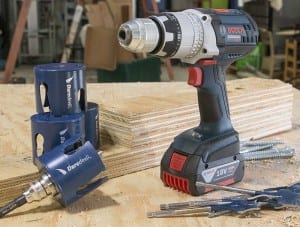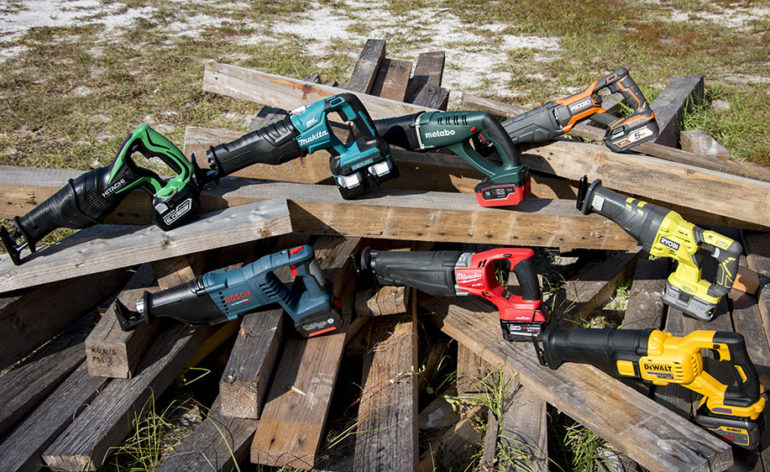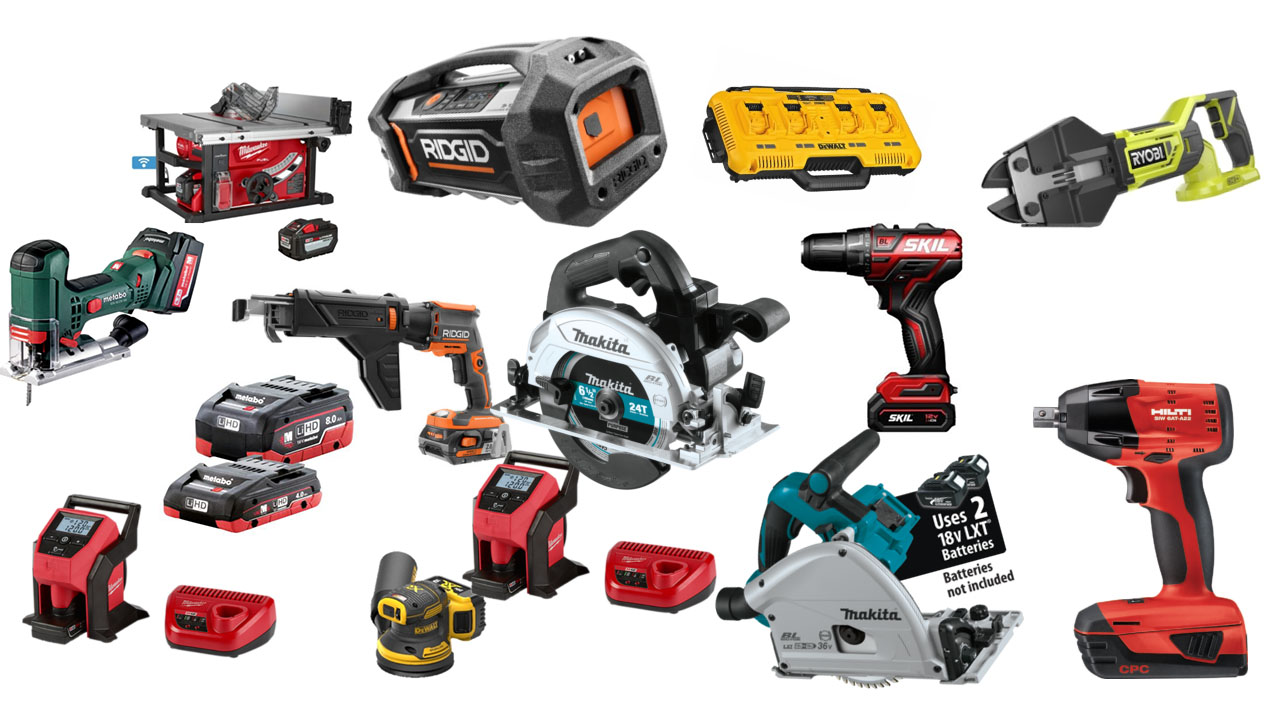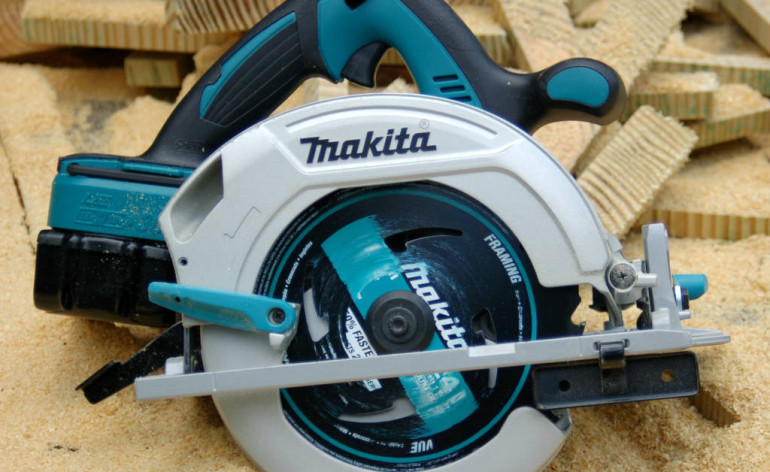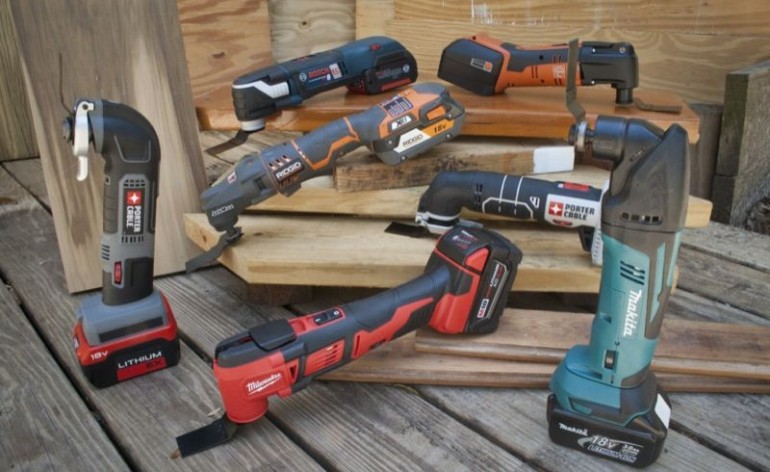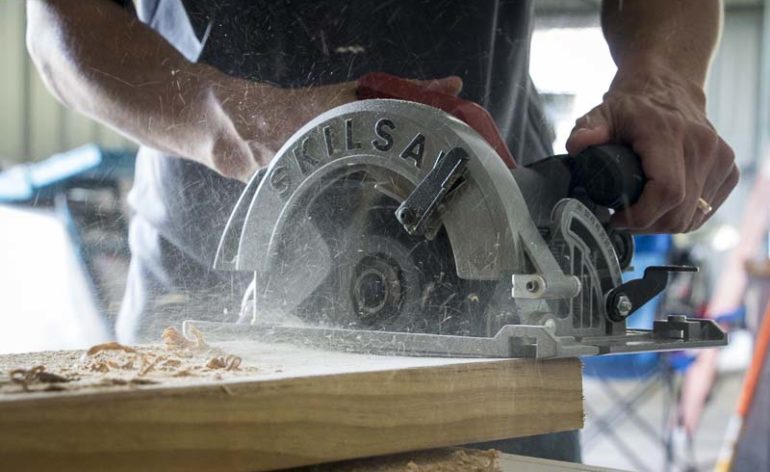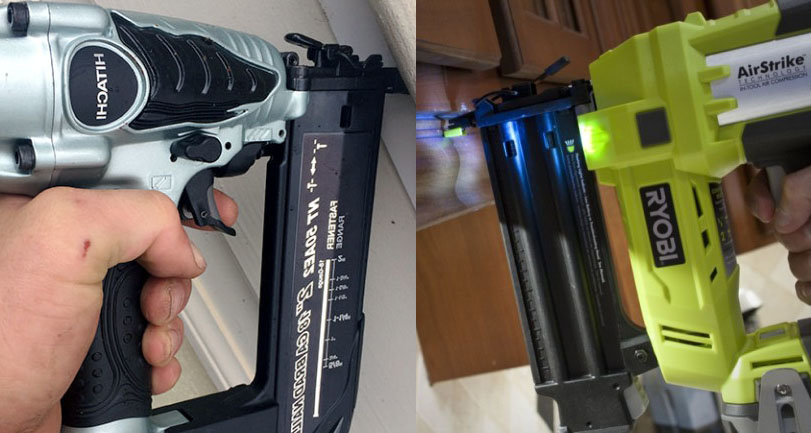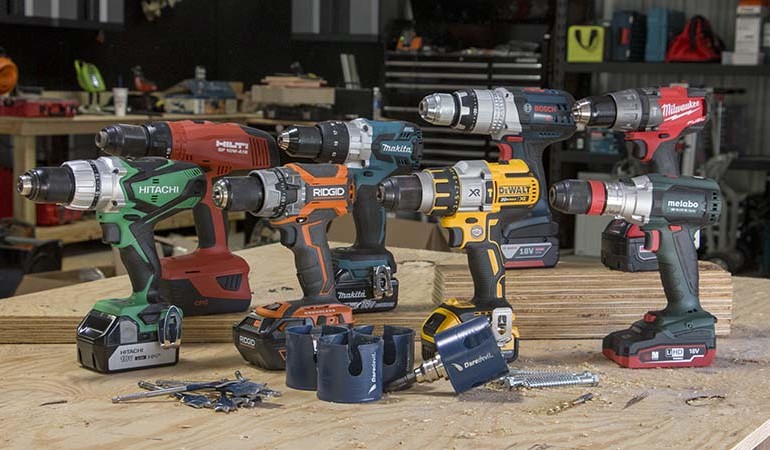 Drills & Drivers January 4, 2016 Kenny Koehler
Drills & Drivers January 4, 2016 Kenny Koehler
A crowded field of power-hungry drills is dissected with power, speed, and torque tests
Ed's Note: This comprehensive tool review is reprinted with permission from ProToolReviews.com, a comprehensive tool review website, as the name infers. If you are a tool junkie, you should go there and dig through their ditches. There's a lot.
There’s little doubt that lithium-ion battery power currently runs the world of drills and impact drivers. With single tool kits starting around $100 (and often on sale for less), the convenience of cordless outweighs any premium gap over corded models.
It’s only in the past year or so, however, that the heavy duty 18V cordless drill has caught up to the power of corded models and run time has been extended—thanks to improved battery technology and brushless motors.
So who makes the best heavy duty 18V cordless drill? We wanted to find out!
What’s really exciting in this “golden age” of cordless drills is that we’re going beyond the power of what used to be considered a standard drill.
Hilti, Makita, and Milwaukee each have models that exceed 1,000 inch pounds of torque. Tasks that have long been considered too stressful for cordless tools are now bowing down to the power of lithium-ion technology and the cordless tools that are powered by these high current-output power sources.
It’s a crowded field of 18V cordless drills. We could test the whole field, but by the time we finish, the next generation would be available, and we'd have to start all over again.
So how did we narrow down the participants? Torque. The minimum requirement for entry was 700 inch pounds of torque, and each cordless hammer drill had to successfully complete our four test applications.
Testing for Real World Performance
Specifications on paper are good, but they don’t tell us how the power is channeled. After all, no two 18V drill models are going to give you identical results. Why? Each manufacturer chooses how to deliver the power most effectively given the variety of tasks they expect users to perform.
In addition, a drill’s true maximum torque can only be achieved for a brief period of time. Actual sustained power is significantly less.
For the lag bolt, spade bit, and hole saw tests performed below, we threw out the fastest and slowest times to account for some of the variation in the material.
Drilling
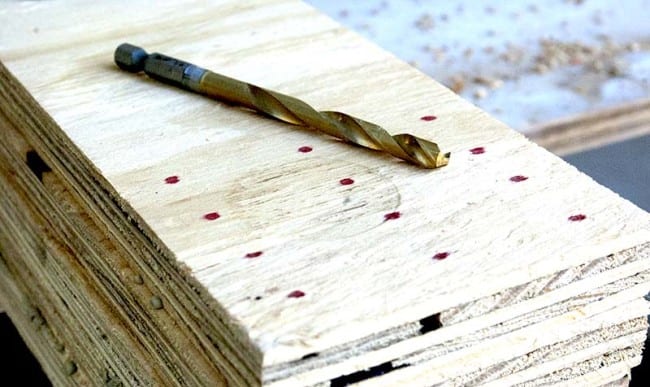
The first test each drill needed to complete was simple drilling. We had each tool drive twelve 1/4-inch holes as pilots for the subsequent lag bolt test.
Each point was marked into the wood and all twelve holes were driven as quickly as possible without stopping the drill between holes. This test used the drill’s highest speed for each model.
Driving Lag Bolts
Driving lag bolts can be a tough task, even with pilot holes already drilled. Each hammer drill was required to drive twelve 3/8″ x 3-1/2″ lag bolts until the base of the head was flush to the wood.
Most models completed this task in their low speed gear, however, DeWalt and Hilti have 3 and 4 speeds respectively. We gave each of those tools a test run to see which gear allowed them to fully drive the lags the quickest—this is a speed test after all.
Boring with 1″ Spade Bits
Where traditional twist drill bits have to step aside for larger hole boring, spade bits are a great choice. They are relatively inexpensive and very effective at removing material quickly.
The 1 inch diameter is fairly common, and all the drills are capable of handling a traditional spade bit in high speed.
Each drill needed to drill 12 holes cleanly to use the high speed data. If a drill failed to make it through consistently, we dropped it down to low speed and started the test all over.
Hole Cutting with 3″ Hole Saws
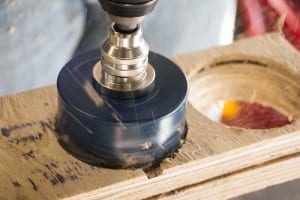
When it comes time to make really big holes, most professionals turn to hole saws. Bimetal hole saws are great for cutting through both wood and metal, but carbide-tipped accessories seem to make the quickest work of wood.
Most heavy duty 18V cordless drills and hammer drills should be able to handle hole saws up to 3 inches in diameter. Go beyond that, and you’re starting to look toward specialty drills like the Milwaukee Hole Hawg.
While each of these drills should be able to handle 3-inch hole saws, Hilti is actually rated for a 6-inch diameter saw.
Each drill needed to cleanly make it through 8 holes for our tests.
Materials and Accessories
Each of the four tests were being performed on stacked 3/4 inch subfloor plywood that was fastened through a combination of thin construction adhesive and screws. Drilling, driving lag bolts, and spade bits were tested on four stacked sheets (approximately 3″ of material).
Hole saws were tested on two stacked sheets (about 1-1/2″ of material).
For the drill bits, we used Milwaukee Titanium Red Helix Twist Bits. The variable helix design helps reduce heat build up, and the titanium coating improves durability.
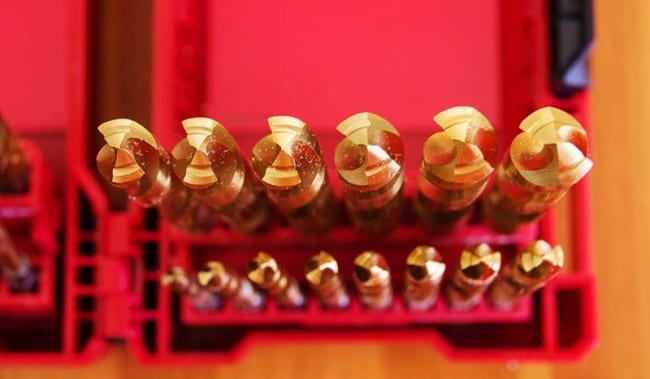
We turned to Bosch Daredevil Spade Bits for the spade bit test. The Daredevil spade bits have a threaded tip which literally pulls the bit through—an important consideration in our choice.
Because the bit transfers the rotational torque to the threads to pull, the drill does all the work without us having to provide downward force. We only need to control the drill.
This adds a twist though—the threaded tip also puts more strain on the drill where you’d often feather a traditional bit. It ended up pushing some drills to the limit in high speed.
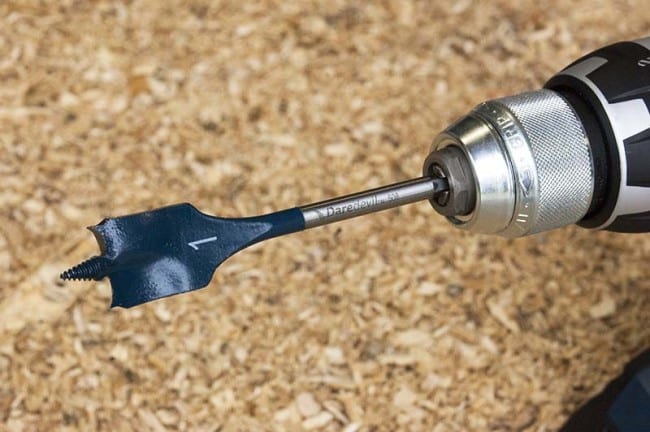
We also looked to Bosch for our hole saws. The 3-inch Bosch Daredevil Hole Saws feature four carbide teeth that offers cutting speeds up to 10 times faster than bimetal versions.
The cup is also 2-3/8″ deep, so you can make it through sheet goods and a piece of dimensional lumber in one pass. The open flutes are nice, and chip and core removal are easier.
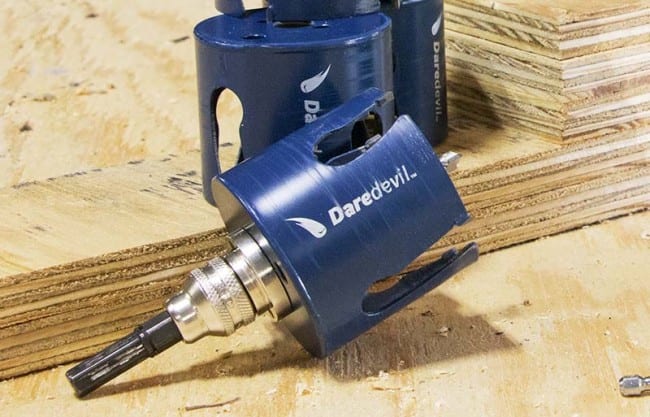
A Note About Run Time
A notable participant missing from our battery of tests is run time. It may seem to be a basic and necessary component, but battery technology and brushless motors have created a monster that has almost eliminated run time concerns in low stress applications.
Could we drill with 3-inch hole saws until each battery was exhausted? Sure, but that’s only applicable for a small percentage of pros.
Could we drill hundreds of 1/4-inch holes or drive an even higher number of 3-inch screws? Absolutely, but we wanted to finish this test before next Thanksgiving.
Point is, we want this head-to-head competition to be about driving performance. Run time testing is definitely still an applicable test, but these drills are doing so much work with the newest generation of batteries that run-time is becoming less and less of an issue.
In addition, not every kit came with each brands’ highest amp hour battery pack. Without getting each model in the best possible run-time scenario, in the end, we’d still be left with questions.
Heavy Duty 18V Cordless Drill Performance Results
Torque and RPM
Before we dig into the results, let’s take a quick look at the maximum torque and RPM ratings for each drill. While this will help explain some of the results, remember that maximum torque can’t be sustained, and there are differences in how the power is distributed in each gear between models.
Speed and torque are inversely related in drills — when one increased, the other has to decrease to compensate for the additional power draw.
Bosch’s HDH181 may have a lower maximum RPM than most, but it’s going to channel more power to torque in high speed than a drill with similar power and a higher top speed.
The lower the speed, the more available power is being transferred to torque in that gear. That’s the trade-off each project manager has to make a call on.
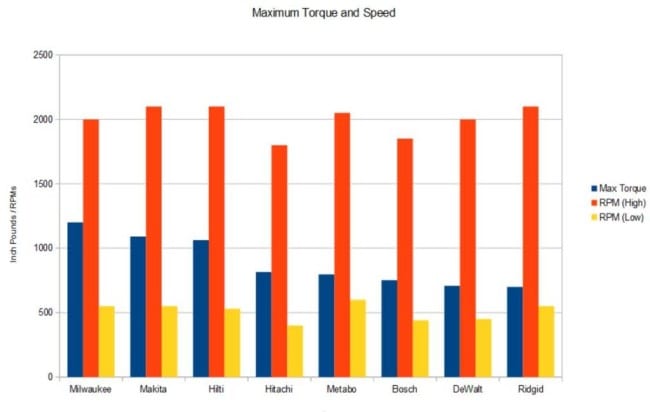
Drilling Test
As you would expect, none of our heavy duty 18V cordless drill participants had an issue drilling twelve 1/4-inch holes in quick succession. Being a simple test (and really just a warm up), each drill only had one shot to get it right.
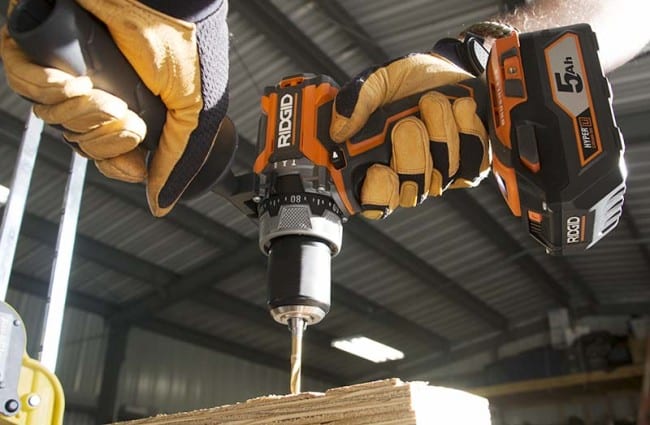
What may be surprising is that the heavy hitters were not’t the winners in this test.
- Ridgid (25.66) seconds was so far ahead of the others that we tested it a second time to make sure it was an accurate result.
- DeWalt (27.23 seconds) came in second.
- Metabo (27.34 seconds) rounded out the top three.
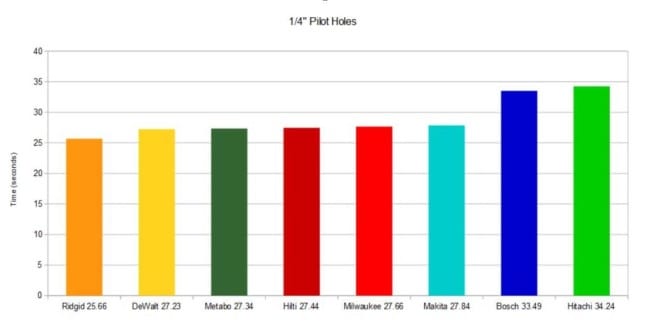
Lag Bolt Test
The only question we had going into this test was whether DeWalt and Hilti would be able to sink the twelve lag bolts in any gear besides low.
DeWalt was really close in second gear, coming up just a 1/2-inch shy of sinking it. Likewise, Hilti was close in third gear, also coming up a 1/2-inch short. Hilti’s heavy duty 18V cordless drill completed the test in 2nd gear (1st gear is really for mixing) while DeWalt was dropped down to low.
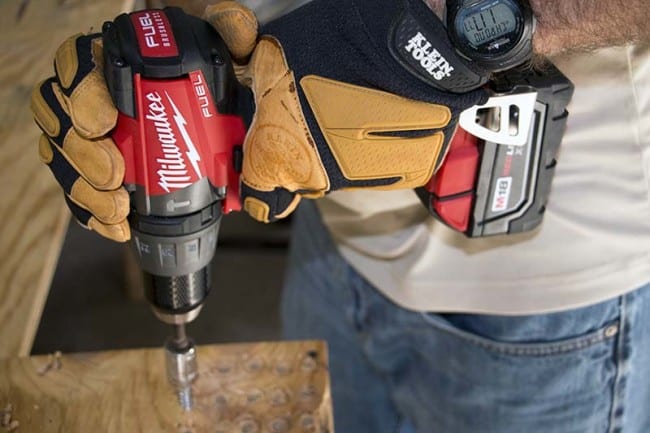
Two compelling results showed up in this test.
- First, Makita (3.66 seconds on average) was far and away the winner, distancing itself from both Hilti (4.11 seconds) and Milwaukee (4.22 seconds).
- Secondly, Ridgid (4.23 seconds) was right behind Milwaukee—impressive considering it states 500 inch pounds less maximum torque!
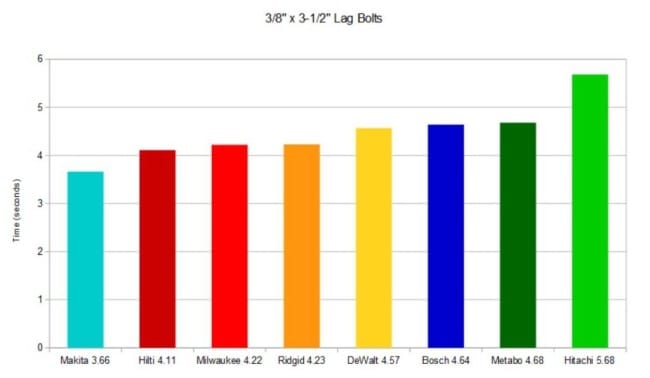
Spade Bit Test
While most drills can handle a 1-inch spade bit in high speed with some gentle persuasion, using threaded spade bits presented a problem for the entire sub-1000 inch-pound group. When using a traditional spade bit, pressure can be backed off, feather the bit through without binding.
Not so with a threaded tip. Each turn of the bit pulls it further down into the material. Because the threaded tip requires no downward force, all we did was steady the drill while the motor and bit provided the work.
We bored twelve holes with each drill to figure out which tools could drill consistently in high speed and which had to be dropped into low gear.
Each drill made it in high, but Bosch, DeWalt, and Ridgid did have to account for a failure or two. Interestingly, it was on breakthrough where each drill experienced the failure to complete the hole.
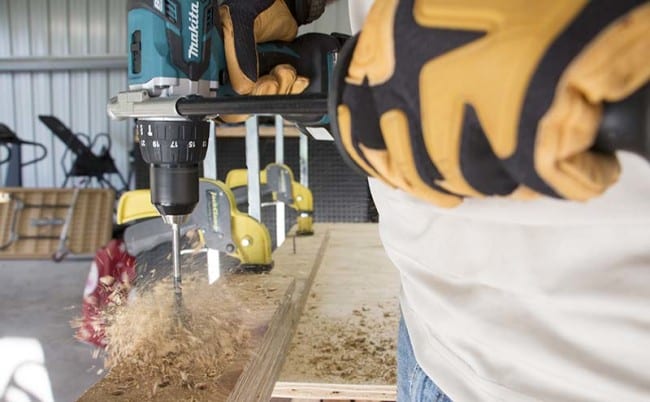
- Hilti (4.23 seconds on average) and Makita (4.24 seconds) were close with Makita posting a faster top speed but Hilti being more consistently on the low end to make for a better average.
- Milwaukee (4.55 seconds) was the last of the sub-5 second group with over a one second gap to 4th place.
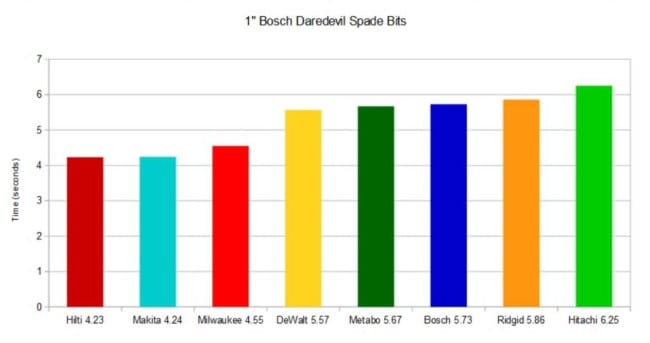
Hole Saw Test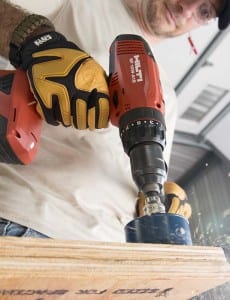
When maxing out the hole saw capacity of each drill (except Hilti) at 3 inches, we tested to see where it would work most efficiently.
With every model, we were able to get the fastest consistent times in high speed thanks to the ability to deliver an exact amount of downward force to keep the drill working without binding.
It’s also safer to use hole saws in high speed. The incredible amount of torque each drill is capable of can easily wrench your wrist or arm if it binds up in low speed. While the auxiliary handles help, some are better than others.
There are absolutely times to cut in low speed, but I prefer to cut in high when the application allows for it.
Unsurprisingly, the Big Three left a fairly wide margin to most of the sub-1000 inch pound group.
- Hilti (7.66 second average) won the battle again.
- Makita (7.71 seconds) was close behind.
- Milwaukee (8.77 seconds) finished off the podium.
- Bosch (9.40 seconds) closed the gap between the groups.
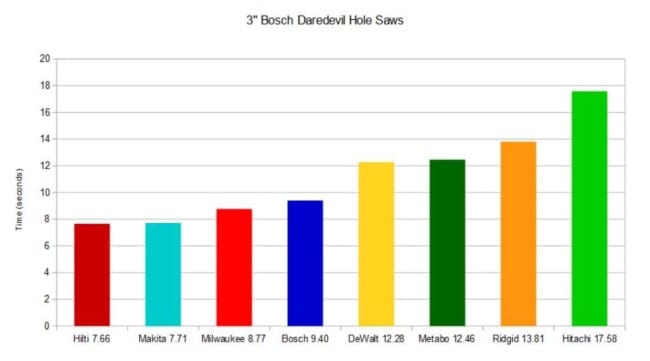
Heavy Duty 18V Cordless Drill Overall Performance Totals
Like any good multisport test, we took the cumulative results and combined them to see how the final podium would wrap up.
Hilti (43.44 seconds) won the day followed by Makita (whose 43.45 seconds was just 1/100th of a second behind and well within our margin of error), and Milwaukee (45.20 seconds) made for clear indicators as to who were our top overall performers in terms of speed and torque.
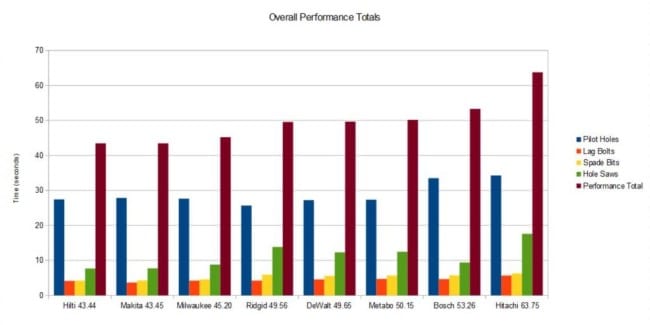
Heavy Duty 18V Cordless Drill Ergonomics, Build Quality, and Value
Performance is great, but we also took a look at the ergonomics, build quality, and value of each model to get an overall ranking. The good news is that none of the drills are ergonomically sub-professional. There also weren't’t any participants that felt cheaply built to us.
All of these heavy duty 18V cordless drill models get our Pro nod in both categories, though some were clearly better than others.
- Considering grip, balance, weight, and experience under load, Ridgid eked out the ergonomics win over DeWalt and Hilti who tied for second.
- For build quality, Bosch gave us the most confidence, followed by Hilti and Makita.
Ridgid still represents one of the best values among professional tools, particularly with their Lifetime Service Agreement. Hitachi also carries a lifetime warranty, but at a higher cost considering the performance.
We found the DeWalt, Makita, and Milwaukee kits all for the same price (warranty info on those is below).
Given the performance and subjective categories, we feel Makita offers the best heavy duty 18V cordless drill value in this group.
Drill by drill closer look
Hilti SF 10W-A18 Cordless Drill Driver Kit
Performance Ranking: 1/8
Overall Ranking: 1/8
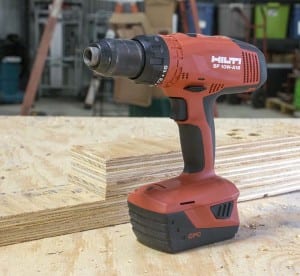
- Model Number: SF 10W-A18
- No Load Speed (RPM): 310, 530, 1210, 2100
- Maximum Torque: 1062 inch pounds
- Weight (lbs.): 4.08 pounds bare, 5.8 pounds with 3.3 amp hour battery
- Length: 10-1/4″
- Price: $459.00 direct from Hilti
- Warranty: 2 Year Limited Warranty
- Includes: SF 10W-A18 Cordless Drill Driver, (2) 5.2 lithium-ion batteries, charger, small soft bag
Summary: Having previously reviewed Hilti’s heavy duty 18V cordless drill and put it up against Makita and Milwaukee, we had a pretty good idea that it would come out on top. While it’s heavy and isn’t boasting a brushless motor (yet), it’s still holding the top spot and endearing itself to the industrial crowd.
The 4-speed gear box allows users to handle mixing duties in low and dial in a variety of applications in the other three. This feature along with its performance makes it the most versatile drill in the group. I’d like to see how this model would perform on a brushless platform.
We really can’t think of anything else we’d like to change aside from bringing down the price tag.
Makita 18V LXT Lithium-Ion Brushless Cordless 1/2″ Hammer Driver-Drill Kit
Performance Ranking: 2/8
Overall Ranking: 2/8
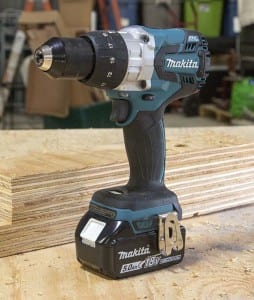
- Model Number: XPH07MB
- No Load Speed (RPM): 0-550 / 0-2,100
- Maximum Torque: 1,090 inch pounds
- Weight: 4.02 pounds bare, 5.38 pounds with 5.0 amp hour battery
- Length: 8-1/4″
- Price: $299.00 at Acme Tools
- Warranty: 3 year limited
- Includes: 18V LXT BL 1/2″ Hammer Driver-Drill XPH07Z, (2) 4.0Ah batteries, 18V Lithium-Ion Rapid Optimum Charger, belt clip, depth gauge, XPH07 side handle, tool case
Summary:
1/100th of a second—that’s all that separated the Makita XPH07 from Hilti’s first place position in the final standings.
With performance near the top and a price tag more than $150 lower, it’s no wonder this is our pick for the top value in the bunch. Makita offers a noticeably long auxiliary handle to go with its 1,092 inch pounds of torque. It worked well for us, but we think anything longer would be cumbersome.
Really the only place where Makita fell behind Hilti was in ergonomics. It did great under load just behind Hilti with solid balance and low vibration. We’d like to see Makita work on the grip ergonomics some to bring it up. It certainly wasn’t uncomfortable, but there’s room for improvement.
Milwaukee M18 FUEL 1/2″ Hammer Drill/Driver Kit
Performance Ranking: 3/8
Overall Ranking: 3/8
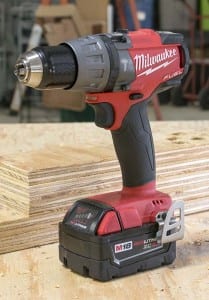
- Model Number: 2704-22
- No Load Speed (RPM): 0-550/0-2,000
- Maximum Torque: 1,200 inch pounds
- Weight: 3.5 pounds bare, 5.14 pounds with 5.0 amp hour battery
- Length: 7-3/4″
- Price: $299.00 at Acme Tools
- Warranty: 5 years
- Includes: M18 FUEL 1/2″ Hammer Drill/Driver, (2) 5.0 amp hour batteries, M18 & M12 Multi-Voltage Charger, belt clip, side handle, carrying case
Summary: Milwaukee came in with the highest overall torque and some high expectations. While it didn’t really challenge the top two spots, it did perform very well and earned its place among the Big Three.
The only issue we came across in this design from Milwaukee was that it had noticeably more vibration transferred than Hilti and Makita in aggressive tasks.
What’s really exciting is that Milwaukee’s 2704 is going to be the foundation of their One-Key drill platform. While Milwaukee could potentially retool this drill to be more tuned in to the tests we put it through, One-Key will allow the user to dial it in.
That means we can tell it (using a smartphone or tablet) exactly how to balance the speed and torque based on what we’re doing that day.
DeWalt 20V MAX XR Lithium Ion Brushless Premium 3-Speed Hammer drill Kit
Performance Ranking: 4/8
Overall Ranking: 4/8
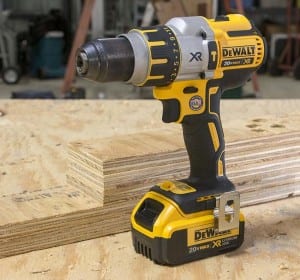
- Model Number: DCD995M2
- No Load Speed (RPM): 0-450 / 0-1,300 / 0-2,000
- Maximum Torque: 708 inch pounds
- Weight (lbs.): 3.4 pounds bare, 4.74 pounds with 4.0 amp hour battery
- Length: 8-3/8″
- Price: $299.00 at Acme Tools
- Warranty: 3 year limited
- Includes: DCD995 1/2″ Hammerdrill, (2) 4.0 amp hour batteries, charger, belt hook, 360° side handle, Kitbox
Summary: DeWalt wins major points with us thanks to its 3-speed motor. Although our tests were mainly low and high stress applications, that middle speed will come in very handy on moderate duty jobs. The fit and feel of DeWalt’s DCD995 were right there with the top contenders. It ended up tied for second in ergonomics, just a single point behind the top spot.
DeWalt comes in with just 708 inch pounds of torque, but performed at a much higher level than its torque ranking would have made us guess.
If DeWalt targets a new hammer drill with torque ranges getting even close to the Big Three, expect to see them compete for the top spot.
Ridgid Gen5X Brushless Compact Hammer Drill/Driver Kit
Performance Ranking: 5/8
Overall Ranking: 5/8
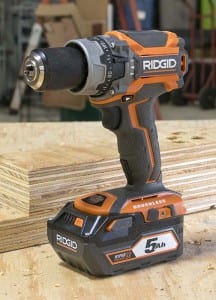
- Model Number: R86116K
- No Load Speed (RPM): 0 — 550/0 — 2100
- Maximum Torque: 700 inch pounds
- Weight: 3.14 pounds bare, 4.88 pounds with 5.0 amp hour battery
- Price: $99 at The Home Depot (w/compact battery and charger)
- Warranty: 3 year, Lifetime Service Agreement
- Includes: Ridgid Gen5X Brushless Compact Hammer Drill/Driver, (2) 2.0 amp hour batteries, charger, auxiliary handle, belt hook, double ended bit, tool bag
Summary: Ridgid caused us all to raise our eyebrows when it set itself apart from the field in our pilot hole drilling test. Its ranking began to fall as the tasks became more stressful, though. That’s not really a surprise given that it comes in with the lowest torque rating in this group.
At around $100 Ridgid is still priced as one of the best values on the market, and we’re getting excellent run-time with the new brushless motor and 5Ah battery (that price includes a single 2.0 Ah battery).
While some may complain of the performance on these tests, this kit (with a pair of 2.0 amp hour batteries) is over $100 less than any other kit we tested, and it comes with a lifetime warranty.
Understanding that it’s going to do its best work in low stress, high volume applications will help set a reasonable expectation for performance. It fact, you’ll see it outperform more expensive models in those tasks.
One of the high points for Ridgid comes in ergonomics.
Ridgid offers what I think is the best rubber over mold on the market. Their Hex-Grip provides cushioning and solid grip on the tool, even when your hands are wet.
It also has the lowest weight of all the models we tested.
Where it suffered the most was in the performance under load compared to the others.
Bosch 18V Brute Tough 1/2″ Drill/Driver w/ Active Response Technology Kit
Performance Ranking: 7/8
Overall Ranking: 6/8
- Model Number: HDH181X-01L
- No Load Speed (RPM): 0-440 / 0-1,850
- Maximum Torque: 752 inch pounds
- Weight: 3.66 pounds bare, 5 pounds with 4.0 amp hour battery
- Length: 9 inches
- Price: $319.00 at Acme Tools
- Warranty: 1 year limited
- Includes: (2) 18V Lithium-ion batteries (4.0 amp hour), charger, LBoxx 2, Exact Fit Insert Tray, auxiliary handle, and double-sided Philips Drive bit
We like the overall design of Bosch’s heavy duty 18V cordless drill. For those of us who aren’t built like Hercules, the active response technology is a key feature to have when working in low speed.
There’s really not much I’d like to see changed with this model. Running at lower RPM’s in both high and low speeds than the competition allows it to deliver a greater percentage of its power as torque.
The result is confident drilling and boring applications.
Don’t let Bosch’s ranking fool you, this is the one model that improved its position the tougher each test got. Of all the drills we tested, the Bosch HDH181 gave us the greatest confidence in its build quality. Plan on this model outlasting its warranty by a long stretch.
It also comes with Bosch’s top notch LBoxx case and custom insert for storage and protection.
Metabo SB 18 LTX BL Quick Cordless Impact Drill Kit
Performance Ranking: 6/8
Overall Ranking: 7/8
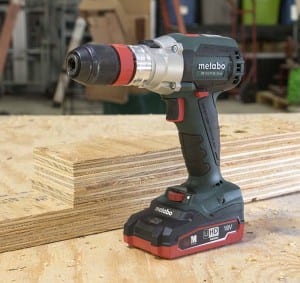
- Model Number: 6.02199.89
- No Load Speed (RPM): 0 — 600 / 0 — 2050
- Maximum Torque: 797 inch pounds
- Weight: 3.3 pounds bare, 4.42 pounds with 3.1 amp hour LiHD battery
- Length: 8-7/16″
- Price: $399 (kit available soon)
- Warranty: 3 year limited
- Includes: Quick Change drill chuck, Quick Change System, side handle, belt hook, MetaLoc case insert, (2) 5.5 amp hour LiHD batteries, and charger
Summary: Metabo’s middle of the road power left it with middle of the road performance. It didn’t surprise us, and it didn’t disappoint us—it performed where it should have on paper.
Metabo shows off its German engineering with an 11 speed electronically controlled brushless motor. Given enough time to play with the settings, you’ll be able to dial in the best mode for a wide range of applications.
Metabo’s Quick Change Chuck also opens up a variety of current and future accessories that make this model even more versatile.
We tested Metabo’s heavy duty cordless drill with the compact LiHD batteries, but we’d recommend you pick up the kit with 5.5 amp hour packs. While we didn’t specifically test the run time, we were pleasantly surprised with how much work we completed before the battery indicator dropped from 4 down to 3 bars.
Metabo is another company that will become a force to be reckoned with if they decide to target higher overall power in their cordless drills like they are with their angle grinders and other cordless products.
Hitachi 18 V Lithium Ion Hammer Drill Kit
Performance Ranking: 8/8
Overall Ranking: 8/8
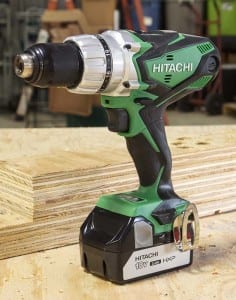
- Model Number: DV18DSDL
- No Load Speed (RPM): 0 — 400 / 0 — 1800
- Maximum Torque: 814 inch pounds
- Weight: 3.82 pounds bare, 5.22 pounds with 3.0 amp hour battery
- Length: 9-5/16″
- Price: $309.99 at Acme Tools
- Warranty: Hitachi’s Lifetime Lithium Ion Tool Warranty, 2 year Lithium Ion battery warranty
- Includes: (2) 3.0 amp hour batteries, charger, side handle, driver bit, battery cover, carrying case
Summary: Unfortunately, Hitachi’s heavy duty 18V cordless drill under performed given its specs on paper. Ergonomically, it has the best grip feel of the entire group. From there it lost ground thanks to its weight and speed under load. It’s also priced a bit high considering its performance.
There’s a silver lining on this cloud though. Hitachi’s purchase of Metabo opens up a door to battery and tool technology that can take the brand to much higher places. Give the two companies some time before you start to see any sharing of technology show up in new models. If it does, however, expect Hitachi to rise quickly.
—This article is reprinted with permission from ProToolReviews.com, an excellent source of tool reviews (as the name implies). Kenny Koehler, a contributor to ProToolReviews wrote this piece.

